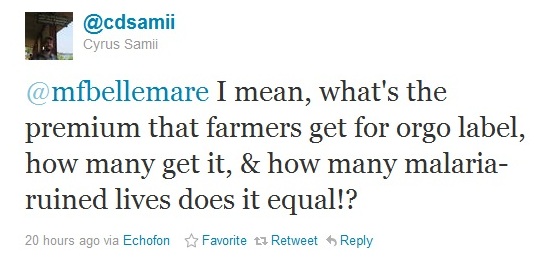From an article that appeared in the New York Times on Thursday:
“When the American government, a generous and close friend to Uganda, began an organic-farming program to help rural economies here, Mr. Acope expanded, selling a wide variety of commodities at good rates.
His one acre became seven. Mr. Acope fathered 11 children. Uganda was developing, and Mr. Acope was one of many who were riding high, he said.
But the very next year came winds of change. Faced with unrelenting malaria, which threatened both lives and livelihoods, Uganda’s government teamed up with the United States to use chemical insecticide sprays — including DDT — to try to eliminate the disease. Mr. Acope’s home district, Apac, which has some of the highest malaria rates in the world was chosen for spraying in early 2008.”
Let me be completely honest here: This type of lazily-thought-through sob story is the very reason why, at the end of my tenure as editor of the student newspaper of the Université de Montréal in 1998, I decided to get as far away from journalism as I possibly could to go to graduate school in economics instead.
Leaving aside for a second the fact that the poverty-reduction claims of organic farming might not be all that they are cracked up to be, my coauthor Zack Brown just defended his dissertation, and in one of the chapters in his dissertation, he finds that the willingness to pay of households for DDT spraying is positive and represents a significant percentage of their income on the basis of a field experiment. In Uganda.
More importantly, as Cyrus Samii put it to me over Twitter:

Exactly. What we get is the story of one man who lost his livelihood. But how about the benefits of DDT spraying policies?
Look, I understand that the New York Times is not the Journal of Policy Analysis and Management, but how difficult is it to think in terms of both costs and benefits?
On DDT Spraying, Organic Farming, and Lazy Thinking
From an article that appeared in the New York Times on Thursday:
“When the American government, a generous and close friend to Uganda, began an organic-farming program to help rural economies here, Mr. Acope expanded, selling a wide variety of commodities at good rates.
His one acre became seven. Mr. Acope fathered 11 children. Uganda was developing, and Mr. Acope was one of many who were riding high, he said.
But the very next year came winds of change. Faced with unrelenting malaria, which threatened both lives and livelihoods, Uganda’s government teamed up with the United States to use chemical insecticide sprays — including DDT — to try to eliminate the disease. Mr. Acope’s home district, Apac, which has some of the highest malaria rates in the world was chosen for spraying in early 2008.”
Let me be completely honest here: This type of lazily-thought-through sob story is the very reason why, at the end of my tenure as editor of the student newspaper of the Université de Montréal in 1998, I decided to get as far away from journalism as I possibly could to go to graduate school in economics instead.
Leaving aside for a second the fact that the poverty-reduction claims of organic farming might not be all that they are cracked up to be, my coauthor Zack Brown just defended his dissertation, and in one of the chapters in his dissertation, he finds that the willingness to pay of households for DDT spraying is positive and represents a significant percentage of their income on the basis of a field experiment. In Uganda.
More importantly, as Cyrus Samii put it to me over Twitter:
Exactly. What we get is the story of one man who lost his livelihood. But how about the benefits of DDT spraying policies?
Look, I understand that the New York Times is not the Journal of Policy Analysis and Management, but how difficult is it to think in terms of both costs and benefits?
Share this:
Published in Agriculture, Commentary, Development, Economics, Impact Evaluation, Policy and Social Sciences